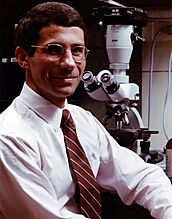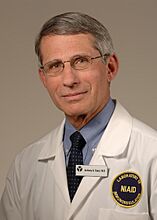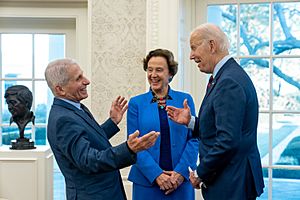Anthony Fauci facts for kids
Quick facts for kids
Anthony Fauci
|
|
|---|---|
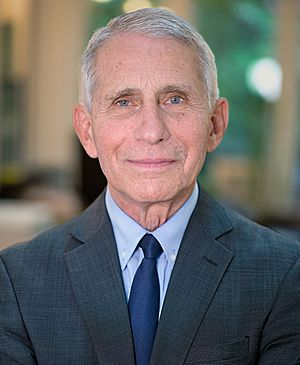
Fauci in 2023
|
|
| 2nd Chief Medical Advisor to the President | |
| In office January 20, 2021 – December 31, 2022 |
|
| President | Joe Biden |
| Preceded by | Ronny Jackson |
| Succeeded by | Vacant |
| 5th Director of the National Institute of Allergy and Infectious Diseases | |
| In office November 2, 1984 – December 31, 2022 |
|
| Deputy |
|
| Preceded by | Richard M. Krause |
| Succeeded by | Jeanne Marrazzo |
| Personal details | |
| Born |
Anthony Stephen Fauci
December 24, 1940 New York City, U.S. |
| Spouse |
Christine Grady
(m. 1985) |
| Children | 3 |
| Education | |
| Awards |
|
| Scientific career | |
| Fields | Immunology |
| Institutions |
|
| Notable students | Drew Weissman |
| Uniformed service | |
| Allegiance | United States |
| Service/ |
U.S. Public Health Service Commissioned Corps |
| Years of service | 1969–1996 |
| Rank | |
Anthony Stephen Fauci (born December 24, 1940) is an American doctor and scientist. He is an immunologist, which means he studies the body's defense system. From 1984 to 2022, he was the director of the National Institute of Allergy and Infectious Diseases (NIAID). He also served as the chief medical advisor to the president from 2021 to 2022.
Fauci was one of the most often quoted scientists in scientific journals for many years. In 2008, he received the Presidential Medal of Freedom. This is the highest award a civilian can get in the United States. He earned it for his work on the PEPFAR program, which helps people with AIDS.
Fauci studied at the College of the Holy Cross and Cornell University. He worked for the National Institutes of Health (NIH) for over 50 years. He has advised every U.S. president since Ronald Reagan on public health. During his time at NIAID, he greatly helped with HIV/AIDS research and other diseases that weaken the immune system.
During the COVID-19 pandemic, Fauci was a key member of the White House Coronavirus Task Force under President Donald Trump. Later, he joined the White House COVID-19 Response Team under President Joe Biden.
Contents
Early Life and Schooling
Anthony Fauci was born in Brooklyn, New York City, on December 24, 1940. He was the younger of two children. His father was a pharmacist and owned a drug store. Fauci helped out at the pharmacy, working the register and delivering medicines.
His grandparents came to the United States from Italy in the late 1800s. As a child, Fauci loved learning about World War II. He also enjoyed playing basketball and baseball.
Fauci went to Regis High School, a challenging school in New York City. He was the captain of the school's basketball team. Halfway through high school, he decided he wanted to become a doctor.
After graduating in 1958, Fauci went to the College of the Holy Cross. He studied classical Greek and worked in construction during the summers. He earned a Bachelor of Arts degree in 1962. Then, he attended Cornell University's Medical College. He graduated first in his class in 1966 with a Doctor of Medicine degree. At Cornell, he focused on infectious diseases and the immune system. He then completed his medical training at New York Hospital-Cornell Medical Center.
Career in Public Health
After finishing his medical training in 1968, Fauci joined the National Institutes of Health (NIH). He worked in the Laboratory of Clinical Investigation at the National Institute of Allergy and Infectious Diseases (NIAID). He became the head of a section in 1974. In 1980, he became chief of the Laboratory of Immunoregulation. In 1984, he was named director of the NIAID. He has been offered the top job at the NIH many times but has always chosen to stay at NIAID.
Fauci has been a leader in the U.S. fight against many viral diseases. These include HIV/AIDS, SARS, Swine flu, MERS, Ebola, and COVID-19. In the early 2000s, he helped create the President's Emergency Plan for AIDS Relief (PEPFAR). He also helped develop medicines and vaccines to protect against biological attacks after the 9/11 terrorist attacks.
Fauci has taught at many medical centers. He has also received many special degrees from universities around the world.
Important Medical Discoveries
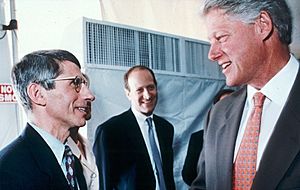
Fauci has made important scientific discoveries about how the human immune system works. He found ways to treat diseases that used to be deadly. These include conditions like polyarteritis nodosa and granulomatosis with polyangiitis. In 1985, his work on these diseases was called one of the most important advances in treating them in 20 years.
He also found a new way to give cancer drugs. This changed a disorder called vasculitis from having a 98 percent death rate to a 93 percent recovery rate.
Fauci has helped us understand how HIV harms the body's natural defense system, leading to AIDS. He has worked on ways to treat patients with HIV and to create a vaccine to prevent the infection. His current research focuses on how HIV infection affects the immune system.
From 1983 to 2002, Fauci was one of the most frequently cited scientists in the world. He has been called a "consistent spokesperson for science." He helped connect the worlds of science and politics.
HIV/AIDS Epidemic Response
In 2020, Fauci said that his career has been largely shaped by HIV. He was a leading researcher during the AIDS epidemic in the early 1980s. In 1981, his team began searching for a vaccine or treatment for the new virus.
In 1988, protesters came to NIAID. Fauci, who became director in 1984, faced anger from the LGBTQ+ community. They felt the government was not doing enough. Fauci worked to connect with AIDS activists in New York and San Francisco. He helped make experimental AIDS treatments more available.
Even though he faced criticism at first, his work was later recognized. A leading AIDS activist, Larry Kramer, who had criticized Fauci for years, later called him "the only true and great hero" among government officials during the AIDS crisis.
Fauci was the main person behind the President's Emergency Plan for AIDS Relief (PEPFAR). This program has saved over 20 million lives in developing countries by fighting HIV/AIDS.
Ebola Outbreak Response
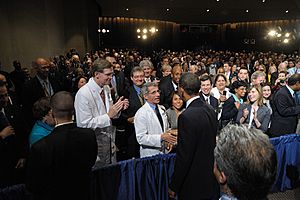
In October 2014, during a U.S. congressional meeting about the Ebola virus crisis, Fauci spoke. He explained that NIAID was still far from having enough cures or vaccines for widespread testing. He said that while research was moving fast, it was important to use public health steps already known to stop Ebola outbreaks. These steps included treating infected people and protecting healthcare workers.
COVID-19 Pandemic Response
Before the COVID-19 pandemic, many people outside the medical field did not know who Fauci was.
During the Trump Administration
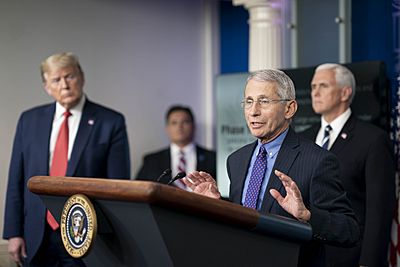
Fauci was part of the White House Coronavirus Task Force. This group was set up in early 2020 under President Donald Trump to handle the COVID-19 pandemic. He became a main public health spokesperson for the president. He strongly supported social distancing efforts in the United States.
In early 2020, Fauci said that COVID-19 was not a "major threat" to Americans. However, he also said it was "an evolving situation" and officials needed to take it "very seriously." He predicted the disease could become a "global pandemic."
In March 2020, he estimated that about 1% of infected people might die. This was ten times higher than the seasonal flu.
Fauci's advice on wearing face masks changed as scientists learned more about COVID-19. At first, he said people who were not sick did not need to wear masks. He worried about shortages for healthcare workers. Later, as studies showed the virus could spread from people without symptoms, he advised the public to wear non-surgical masks. He explained that policy changes were needed as new information became available.
Fauci faced criticism and even threats because of his advice. He said his family also received harassment.
In June 2020, Fauci expressed concern that large protests could cause "surges" in COVID-19 cases. He advised avoiding crowds of any kind.
He also stated that the U.S. was "still knee-deep in the first wave" of cases. He warned against feeling too comfortable about a lower death rate. He said there were "so many other things that are very dangerous and bad about this virus."
Fauci disagreed with some ideas about "herd immunity" that would let many people get sick. He called it "total nonsense" and said it would lead to many deaths. He explained that protecting vulnerable people would be very difficult.
In October 2020, Fauci objected to his words being used in a political advertisement. He said his words were taken out of context and he had never supported a political campaign.
During the Biden Administration
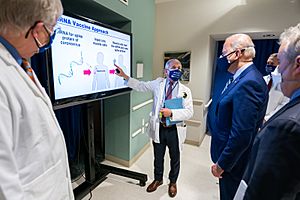
In December 2020, President-elect Joe Biden asked Fauci to stay as NIAID director. He also asked him to be the chief medical advisor to the president. Fauci accepted both roles.
After President Biden took office in January 2021, Fauci said he felt "liberated." He could speak freely about science without interference. He saw Biden's administration as committed to being "completely transparent, open and honest." Fauci helped create the Biden administration's plan for a nationwide COVID-19 vaccine rollout.
In early April 2021, Fauci said the situation in the U.S. was "almost a race" between getting people vaccinated and a new surge of cases.
In May 2021, Fauci said he was "not convinced" that COVID-19 came from nature. He believed that scientists should keep investigating how the virus started in China. Later that month, he said fully vaccinated Americans did not need to wear masks outdoors, except in very crowded places. This advice was updated in July 2021 to recommend masks for everyone indoors due to the Delta variant.
Fauci announced in August 2022 that he would leave his positions in December. He wanted to pursue the "next chapter" of his career. He officially resigned on December 31, 2022.
On January 20, 2025, President Biden took a special step to protect Fauci. He issued a pardon for any federal offenses Fauci might have committed between January 1, 2014, and the pardon date. This was done to shield him from possible future legal actions.
Later Career Steps
On June 26, 2023, Georgetown University announced that Fauci would join their staff. He became a distinguished professor, teaching in both the School of Medicine and the McCourt School of Public Policy. His new role began on July 1, 2023.
Cultural Impact and Recognition
Because of his important role in fighting major diseases like HIV/AIDS and COVID-19, Fauci has been featured in many forms of media. These include TV shows, books, and even internet memes.
In the spring of 2020, during the COVID-19 pandemic, bakeries started selling pastries with Fauci's face on them. This was a way to honor his work in public health.
In September 2021, a documentary film about Fauci's life and career, called Fauci, was released. It was produced by National Geographic Documentary Films.
Personal Life
Fauci has lived in the same house in Washington, D.C. since 1977. In 1985, he married Christine Grady. She is a nurse and a bioethicist at the NIH. They met while caring for a patient. Christine Grady is now the chief of the Department of Bioethics at the National Institutes of Health Clinical Center. They have three adult daughters.
Fauci has described himself as "completely nonpolitical." He is not officially linked to any political party, but he does vote. Before 2020, he had good relationships with leaders from both major political parties. He considered President George W. Bush a close friend. Fauci has praised Bush's work on the PEPFAR program, which has saved millions of lives, especially in Sub-Saharan Africa.
Awards and Honors
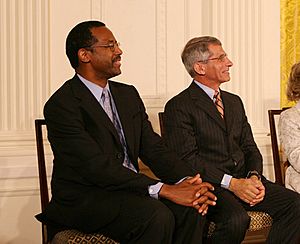
Fauci has received many awards and honors for his work, including:
- 1979: Arthur S. Flemming Award
- 1995: Ernst Jung Prize
- 2005: National Medal of Science
- 2007: Mary Woodard Lasker Public Service Award
- 2008: Presidential Medal of Freedom
- 2013: Robert Koch Gold Medal
- 2016: John Dirks Canada Gairdner Global Health Award
- 2020: Federal Employee of the Year
- 2020: Time's Guardian of the Year
- 2021: Public Welfare Medal
- 2021: Dan David Prize
- 2023:
 Order of the Rising Sun, 2nd Class, Gold and Silver Star
Order of the Rising Sun, 2nd Class, Gold and Silver Star - 2023: Foreign Member of the Royal Society
In 2022, the College of the Holy Cross renamed its science building the Anthony S. Fauci Integrated Science Complex in his honor.
Images for kids
Selected Works
![]() Wikidata ()
Wikidata () ![]() Wikidata ()
Wikidata () ![]() Wikidata ()
Wikidata () ![]() Wikidata ()
Wikidata () ![]() Wikidata ()
Wikidata () ![]() Wikidata ()
Wikidata () ![]() Wikidata ()
Wikidata () ![]() Wikidata ()
Wikidata () ![]() Wikidata ()
Wikidata () ![]() Wikidata ()
Wikidata ()
See also
 In Spanish: Anthony Fauci para niños
In Spanish: Anthony Fauci para niños
 | Jackie Robinson |
 | Jack Johnson |
 | Althea Gibson |
 | Arthur Ashe |
 | Muhammad Ali |


